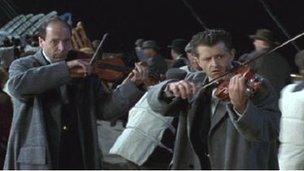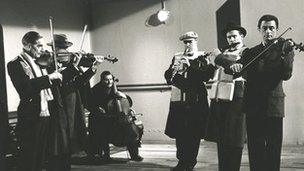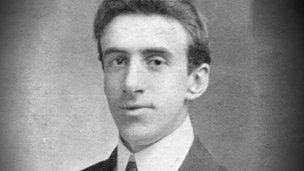Could music have calmed passengers as the Titanic sank?
- Published

The band could have helped to keep passengers calm by masking sounds of crying
The heroic image of the Titanic's musicians playing on deck as the liner sank features in every book and film about the tragedy.
But questions still remain over what they played and whether it helped calm passengers trying to get to safety.
The musicians played for more than two hours after the liner hit an iceberg while passengers struggled to get into lifeboats in the early hours of 15 April 1912.
Initially it was upbeat ragtimes and waltzes from the repertoire they would have performed in the first class areas of the ship.
Composer Peter Young, who has created a piece of music to coincide with the recent 100th anniversary of the sinking, said a lot of what the band played "would have been jolly stuff".
"From songs in the trenches through to lullabies, music has a direct impact on the emotions I'm sure," he said.
While there is no research into the impact of music in situations of extreme stress there have been studies in therapeutic and laboratory contexts on the effects of music.
Music psychologist Dr Nikki Dibben from the University of Sheffield said: "There is research that shows music can reduce people's perceptions of pain.
"There is also quite a lot of research showing that people use music in everyday life to regulate particular moods."

The musicians playing until they sank with the Titanic features in every reproduction of the tragedy
Studies show people have to like music for it to have a positive impact on their emotional state.
Masking sobbing
Dr Dibben said "there is potential" for music to have influenced how Titanic passengers felt because ragtimes and waltzes were popular, well-known songs.
She added: "The associations music has for people can affect emotions and ragtimes and waltzes suggest dance and happy social contexts."
The band could have also helped to keep passengers calm if the its music blocked out sounds that would heighten anxiety.
"Masking of the sounds of waves, sobbing, hysteria that could be really beneficial," said Dr Dibben.
Dr Dibben also suggested that playing music as the Titanic sank could have had a purpose for the musicians as well as the passengers.
"Research into why people engage in music making shows that it provides a domain which is different for the everyday and provides a connectedness to fellow performers as well as the audience," she said.
Final song
There are differing accounts as to what was the band's final song.

Wallace Hartley was the band leader on the Titanic
John Graves, a curator at the National Maritime Museum in Greenwich, said there was "very strong evidence" it was the hymn Nearer My God To Thee.
"The band's leader Wallace Hartley was a devout Methodist. His family had carved into the monument over his grave the first bars of the Arthur Sullivan version of Nearer My God To Thee," said Mr Graves.
Mr Hartley was reported to have told a colleague on the Mauritania, another transatlantic liner, that if he was on a sinking ship he would gather his band to play either Nearer My God To Thee or Oh God Our Help In Ages Past.
But <link> <caption>Harold Bride</caption> <url href="http://www.encyclopedia-titanica.org/statement-harold-bride.html" platform="highweb"/> </link> , a wireless operator on the Titanic who survived the sinking, told The New York Times: "The ship was gradually turning on her nose... I guess all the band went down. They were heroes. They were still playing Autumn."
"He [Bride] was almost certainly referring to the waltz Autumn... newspapers at the time interpreted it as the hymn Autumn," said Mr Graves.
He added that Mr Bride's account gained a lot of credence being included in Walter Lloyd's book A Night To Remember, "which is considered to be a definitive account of what happened to the Titanic."
Band leader Wallace Hartley and his musicians John Woodward, John Frederick Clarke, Georges Krins, Theodore Brailey, John Law Hume, Percy Cornelius Taylor and Roger Bricoux all died in the Titanic disaster.
- Published15 April 2012
- Published28 March 2012
- Published21 February 2012
- Published6 January 2012